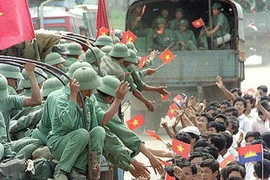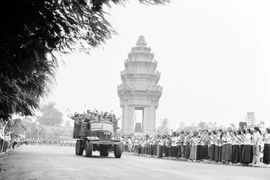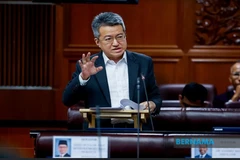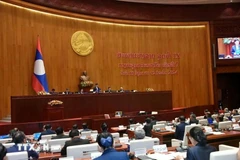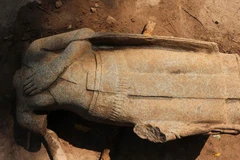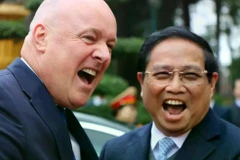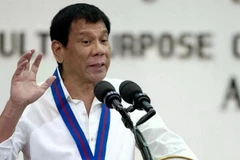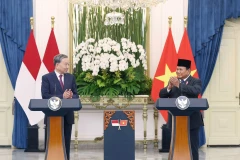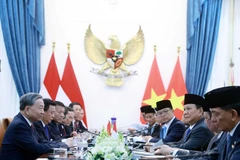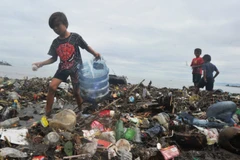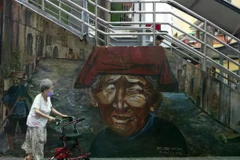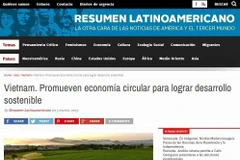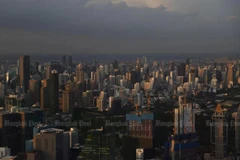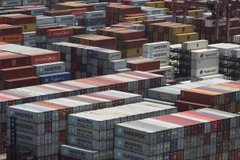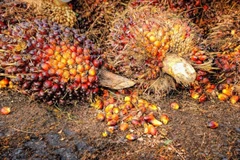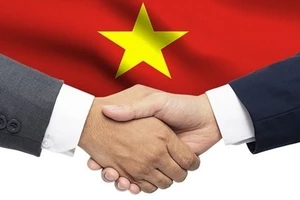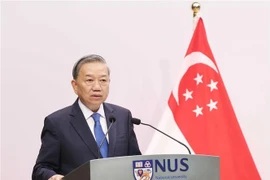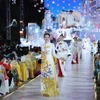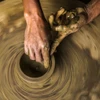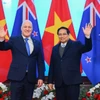 A scene of Vietnamese troops coving Cambodian children against an attack by Pol Potist troops in the film “First they killed my father” (2017).
A scene of Vietnamese troops coving Cambodian children against an attack by Pol Potist troops in the film “First they killed my father” (2017).
Hanoi (VNA) - In September 2017, the film “First they killed my father” by Angelina Jolie, based on the memoirs of Loung Ung, was aired on Netflix channel, once again exposing the terrific crimes committed by the Pol Pot genocidal regime to the world.
In an interview granted to VietnamPlus, writer Trung Sy, author of the memoirs “Story of southwestern troops”, said the film was made in a meticulous and practical way, especially the episodes on featuring the tragedy suffered by Ung’s family in particular and the majority of the Cambodian in general in that dark period.
Before that, another movie on the period, “The killing fields” in 1984 by director Roland Joffe, also won great attention as it won three Oscar awards.
How practical the cinematography can be, it is incomparable to the extreme miseries suffered by the Cambodian in the Pol Pot regime. The killing fields and the Toul Sleng prison are still able to make many feel frozen.
Those painful memories are still unerasable to a whole generation of the Cambodian people, although 40 years have passed by.
According to international historians, while in power from 1975 to 1979, the Pol Pot regime had caused the deaths to about 3 million Cambodians, or 25 percent of the country’s population. A terrifying figure.
60-year-old Routh Chantha, a resident of Chamkar Mon district, Phnom Penh, recalled the period of family separation and miseries in that brutal regime. He also shared his feelings with VietnamPlus on the historical victory on January 7, 1979, of the Vietnamese volunteer troops who joined hands with the Cambodian army and people in liberating the country from the genocide.
 From left: Pol Pot, Nuon Chea, Ieng Sary and Son Sen in Phnom Penh from 1975 to 1979 (Photo: Frederic Amat/Sygma/Getty Images)
From left: Pol Pot, Nuon Chea, Ieng Sary and Son Sen in Phnom Penh from 1975 to 1979 (Photo: Frederic Amat/Sygma/Getty Images)
- What do you remember on the days under the Pol Pot regime? At that time, how was the life of your family and yourself?
Under the Pol Pot regime, I was still a young boy. It is impossible to count all the sufferings. In the rainy season, the food was extremely scarce and we had to exhaust our strength in the work in the communities, but even porridge was not available. All of the people had to work after provisions by Angkar (organization), each hectare must yield 3 tonnes of paddy.
All kinds of freedom were eliminated. Those who opposed would be dealt with in a brutal way. It was the same to me, my family members were separated. I was in one place and mother, in another. It can be said that the three years under the Pol Pot regime is in fact a dark period to us.
 "My country was liberated on January 7, 1979, I personally stood side by side with Vietnamese volunteer troops from the first days of the fight against the blood-thirsty Khmer Rouge," Routh Chantha said.
"My country was liberated on January 7, 1979, I personally stood side by side with Vietnamese volunteer troops from the first days of the fight against the blood-thirsty Khmer Rouge," Routh Chantha said.
- How do you think of the victory on January 7, 1979 of the Vietnamese volunteer troops and Cambodian progressive forces?
My country was liberated on January 7, 1979, I personally stood side by side with Vietnamese volunteer troops from the first days of the fight against the blood-thirsty Khmer Rouge. We did not have any doubt on the significance of the fight.
Experiencing the months and years of the hard war and witnessing the days of joining Vietnamese troops to many localities, I myself feel that Vietnamese troops braved their separation from their home villages, shedding their blood for the liberation of the Cambodian people and country from the genocidal tragedy.
- Peace of Cambodia was achieved with untold blood of Vietnamese troops and progressive forces of Cambodia. Experiencing a painful period of the history, what do you want to tell the current Cambodian people?
I myself have experienced various hard periods. AS the country is today enjoying stability and peace, I hope that the younger generations, including youths and my descendants, will try to study and improve their capacity so as to contribute to the national development.
I would like to send a message to the younger generations that they should not develop the idea of blaming one another but try to study and absorb the progress of the world in service of the nation, thus deserving the sacrifices by their predecessors.
 Tens of thousands of Phnom Penh people line roads to bid farewell to Vietnamese volunteer troops who have accomplished their international obligation and coming back, in June 1984 (Photo: VNA)
Tens of thousands of Phnom Penh people line roads to bid farewell to Vietnamese volunteer troops who have accomplished their international obligation and coming back, in June 1984 (Photo: VNA)
Inheriting the fruits hard won by their predecessors, the younger generations would try to perfect themselves and avoid the national division which happed in the times of Lon Nol and the Khmer Rouge. I really understand those values, the values of peace and national unity.-VNA



